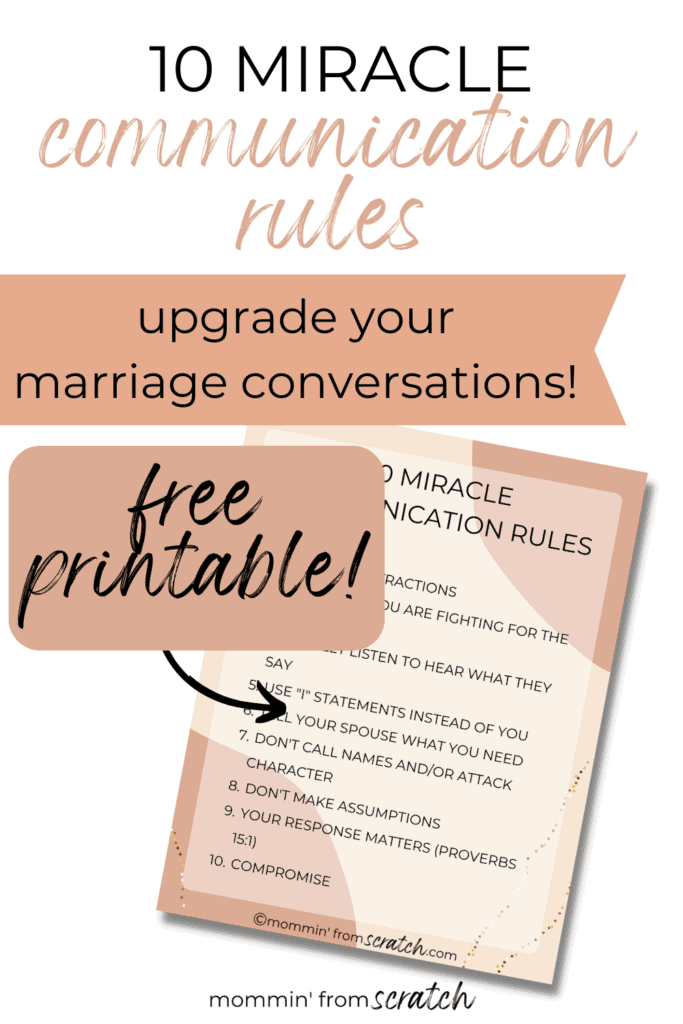10 Miracle Marriage Communication Rules you Need Right Now
This post will teach you 10 marriage communication rules to use during every disagreement you have with your spouse. *There is an option to print this list at the end of the post.
Bob and Sue have been married for 6 years. At the beginning of their marriage, they would get in fights which led to them making habits of how they left the conversation.
-Sue decided she would hold onto every time Bob hurt her until it built up so much she would explode on him.
-Bob decided that he would decide what Sue wanted and would interrupt her before she finished each sentence and then would walk away just as mad as when the conversation began.
Instead of trying to figure out how to heal and move on from your last fight, why not learn to eliminate the fight, to begin with?
Let’s stop picking up the pieces after the fight, and learn how to talk to each other so that there won’t be a need to reconcile.
We have to start focusing on the importance of communication in marriage.

Marriage Communication Rules
I’m sure you’ve heard the phrase “marriage isn’t easy.” But let’s change that. Marriage isn’t easy unless you equip yourself with some wisdom in the areas that need improvement.
These rules are for any conversation that has a disagreement or hurt at the center of it. However, you can use these for any and all times you talk with your spouse.
There is an option at the end of this post to print this list. So you can put it up on your fridge or give it to a newlywed couple.

First – gain understanding before the rules.
This is important.
It is good to start from a place of understanding.
Understand that both of you grew up in completely different households.
With completely different rules of communication.
And the way your environments shaped each other plays a huge role in how you now communicate.
But just because you have learned to communicate in such a way, and you are used to it doesn’t make it the “right way”.
There is also something else to understand.
And that is expectations.
Each of you has an expectation from the other that your spouse may or may not know about.
That’s why you fight.
One of you was expecting a different result from the other.
So we’ll dive deeper later in this post about expectations but I want to explain here that the same forces that shaped the way you communicate also shape your expectations.
But the beauty of marriage is that the two of you will slowly become “one”. And communication is a huge part of that melding.
Let’s dive in.
1. Pray first
Even in anger, God is there. He created your union and wants to be a part of all things.
I suggest starting with prayer. If you don’t know what to pray here is a short prayer to start with:
“Lord thank You for the ability to come together and try to reconcile our differences. I pray that you give us peace in the midst of this, that you give us wisdom in our conversations and that we can end this discussion closer as husband and wife.”

2. Remove distractions
Is it fair to your spouse if you’re distracted?
Turn off the TV.
Put phones in a different room.
Have the conversation when the kids are in bed.
Whatever it is that would make your eyes not look into the eyes of your spouse get rid of it.
And while we’re at it, try your best to look at your spouse when they are speaking, it’s a sign of respect and it shows your spouse that you care about what they are saying.
3. Remember you are fighting for the same team
The goal of this conversation is to be able to compromise. It is not to win. If you win your spouse loses which means you both lose.
You’re on the same team. Any loss is a loss to you both and to your marriage.
In order to win you have to learn how to diffuse the situation for each other and how to leave the conversation together not apart.
4. Actually listen to hear what they are saying- don’t listen to respond
Most of the time when we hear something hurtful we are formulating a response. Instead of actually listening to what our spouse is saying.
If we don’t hear what they say and understand that they are hurting, we are only formulating a response to win.
If one wins, remember rule number 3- you both lose.
So when your spouse is talking pay attention to what they are saying. And not just what they’re saying, try to focus on how they are trying to relay to you how what happened made them feel.
Because that is why they are telling you this, whatever happened or whatever is bothering them, makes them feel a way that they shouldn’t have to feel in marriage.
Instead of listening to respond, pay attention with a focus on how to make it right.
And understand that sometimes making something right isn’t as simple as a reply, it requires action.
5. Use I statements instead of You
This may take some practice, but any step in the right direction is a step. And practice makes perfect.
So instead of saying “you did this” “you did that” say instead: “I felt hurt when you did this” “I felt ignored when you…”
And say how you felt, try to express what you were feeling so that your spouse can try their best to understand that hurt.
6. Tell your spouse what you need
If you are the one expressing hurt do not beat around the bush. You cannot expect your spouse to read your mind.
If they don’t know what’s wrong then there is no way to fix it. This is your partner and if you need something from them, then they need to know.
If you need them to text you when they’re off work so that you know they’ll be home then let them know this is what you need.
If you need them to help with the dishes after dinner then let them know.
Whatever it is, you guys can work out and compromise as a team to figure out how to meet each other’s needs.
You can avoid difficult conversations as much as you want, but ultimately it’s only going to hurt your marriage.
When you express your needs to each other- two things happen:
- Your spouse now knows what’s been on your mind, and you have a chance to grow closer together as a married couple.
- You’re building trust and intimacy with your spouse. You’re trusting them with the information, and if they implement your need, they build your trust and your intimacy grows.
Related: 5 Questions to Ask your Spouse to Immediately Improve your Marriage
7. Don’t call names, attack character or use the words always or never
These are marital communication skills 101. The more you bring your spouse down, the more your marriage is brought down.
Calling names is a huge no-no. When you call names you are defining your spouse. You are giving them something to mull over in their mind wondering if you meant what you said. And if you say it enough they may start believing it.
This is how to single-handedly ruin your marriage.
Side note- if this is something you have been doing, it’s time to actively pursue building your spouse back up with the truth of who they really are. Find their good qualities and tell your spouse that you see them.
Attacking their character essentially has the same effect. If they made a mistake once, that doesn’t mean that they will always make that mistake, which brings us to the next point.

The words “never” and “always” should never be a part of your conversation when you are talking about your spouse.
They don’t “always” do something because that leaves no room for change.
When you say they “never” do anything it discredits the times that they actually did do it and they feel worthless and like there’s no point in even trying because you will always lump their actions altogether.
Your spouse is more than your simple math to add up all their actions and predict that because they did something a few times or even a million times that they cannot change.
8. Don’t make assumptions
First, remember that this list is being brought into the conversation because you are both trying to change the way you communicate.
So do not assume that this conversation will end the way all your conversations will end. You’re giving up before even trying.
If your spouse says they need to talk to you later about something, don’t make assumptions about the conversation.
If you make assumptions and speak them to your spouse your spouse is going to enter the conversation feeling defeated before they even begin. And then again like number 3, you both lose.
9. Your response matters Proverbs 15:1
A soft answer turns away wrath, but a harsh word stirs up anger. Proverbs 15:1
In anger, it is hard to respond with “a soft answer” however with practice and patience this can be achieved.
So to eliminate interruption and a harsh response practice pausing.
This is going to sound, look, and feel weird at first.
But most of the time our first response is not the most polished, and when we spew words we cannot take them back.
So pause.

Pause and think first about what your spouse said, how they’re feeling.
Then think about your responsibility in the matter.
Are you responsible for their hurt? Then your response needs to include acknowledgment of how you hurt them and an apology.
Here’s something you can say- and trust me if you’re not used to apologizing your spouse will appreciate the effort even if the template comes off of this list that you’re both reading.
I see how I hurt you by ______________________. I understand that it made you feel ________________________. I’m sorry for _________________. Will you forgive me? I plan on fixing this behavior by ______________________.
Here’s an example:
I see how I hurt you by ignoring your phone call. I understand that if made you feel ignored and not a priority. I’m sorry for making you feel that way and for not answering your call. Will you forgive me? I plan on fixing this by making sure to answer your call if I’m not busy and if I am busy I will text you and let you know that I can call you back as soon as I’m not busy.
This is how you take a step towards resolution.
10. Compromise
Sometimes a resolution is simple. But a lot of times compromise is needed.
Compromise means you both need to make a movement.
You have to give a little bit in order to meet in the middle.
So taking the example conversation in number 9, if the person who was hurt by the rejected call expects their spouse to drop everything to answer their call that may not be practical.
If their spouse is at work and has to accomplish a task or is in the middle of a conversation with their superior then it isn’t practical to answer a phone call.
So that conversation can end in compromise, with one spouse understanding that it is hurtful to reject calls for no reason but when they do have a reason they will let the other know. And with the other spouse understanding that their call may not always be able to be answered right away.
But it also builds trust: by the offended spouse making a promise to send a text letting the other know they are busy or by actually answering the call, it slowly builds confidence in the offended spouse that their hurt has been heard and eventually it won’t be an issue anymore.
So if you’re not meeting eye to eye on something what can each of you do to compromise?
Diving deeper- understanding expectations
Your spouse most likely expects you to react and respond differently than you do.
Their world shaped an expectation of conversation and chances are you grew up in completely different conversation worlds.
Let’s start by knowing this: unless you were taught by some expert communicator, there is always room to grow.
Our expectations in a marriage are usually a huge trigger for fights.
Maybe Sue expects Bob to always open her car door because that is what her father did for her. Her father told her that if a man doesn’t open her car door that he doesn’t love her.
But Bob’s parents never even brought up the idea of opening the car door for a woman. While Sue is secretly resenting Bob for something she’s never mentioned to him yet expects of him, Bob is completely in the dark on why his wife is mad every time they get in the car together.
This is why having a separate conversation about expectations is important. Refer to number 6. And if something triggers a reason why you’re mad and you realize it is because you have an expectation of your spouse, bring it up to them. And compromise.
Do not expect your spouse to have the same expectations as you. But make progress in communicating those expectations and seeing where you can meet in the middle.
There is a direct correlation between communication and intimacy, the more you practice the better you’ll become. Feel free to always use these marriage communication tools every time you sit down to talk.
Find something that helps you practice communicating that doesn’t begin with a fight
There are plenty of resources out there that will help you practice communicating. One of my favorites is a daily devotional that asks questions that spark conversation. It is called Moments Together by Dennis Rainey and you can grab that here. It is my husband’s and my favorite devotional!
I also offer a free 5-day marriage revival course that you can sign up for here.
Want to keep a copy of this handy?
You can sign up below to get this as a free printable. Feel free to print this and post it on your fridge and or give it as a gift to a married couple!






Thank you